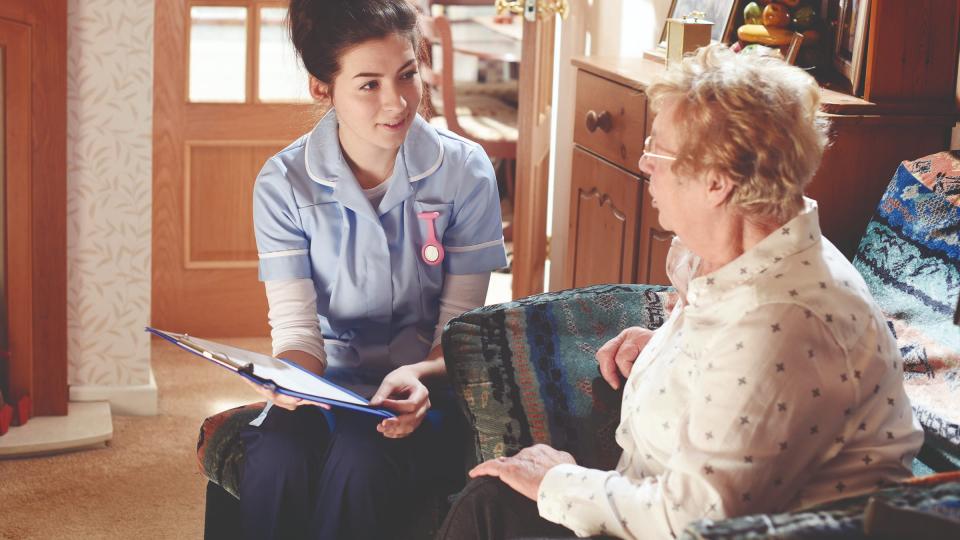
European Institute for Person-Centred Health & Social Care
European Institute for Person-Centred Health and Social Care
We focus on academic research which informs moving away from current approaches to the management of chronic illness and towards newer models of care that are personalised, integrated and contextualised.
About the institute
A new challenge to global public health has emerged over recent decades: a dramatic rise in the incidence and prevalence of long term, chronic co- and multi-morbid, socially complex illnesses.
Of the 40 million deaths attributable to these conditions in 2015, over 15 million deaths occurred in people aged between 30 and 69 years old, during their most productive years of life.
Within Europe, these illnesses are the leading cause of death, disease and disability, accounting for approximately 86% of deaths and 77% of the disease burden, placing an increasing strain on modern health and social care systems. They account for a significant loss of economic productivity, so that for every 10% increase in deaths from these illnesses, there is a 0.5% reduction in economic growth.
The World Health Organisation (WHO) has warned that the rising costs of treating these illnesses has the impending capacity to bankrupt health systems worldwide, given the direct costs of increasingly depersonalised clinical services and inadequate social support. The last decade has brought with it an increasing recognition that chronically ill patients need more comprehensive forms of assistance, towards newer models of care that are personalised, integrated and contextualised.
This way, affordable biomedical and technological advances can continue to be delivered to patients on the basis of objective clinical assessment, but within a humanistic framework of care which strives to understand their subjective experience of illness.
Given the considerable clinical and social complexities of chronic illnesses, achieving person-centred care in practice will require the coordinated actions of a variety of stakeholders, including:
- researchers and educators
- multidisciplinary clinical teams
- social care professionals
- family carers and professional carers
- chaplains
- NHS managers
- transformational leaders
- expert patients
- patient advocacy groups
- community leaders
- media professionals
- pharmaceutical and healthcare technology industries
- politicians and policy-makers
Collectively, these stakeholders constitute what has come to be termed the "health and social care ecosystem." The education of these individual stakeholders, at the appropriate level, in the appropriate context, is pivotal to a successful implementation of person-centred care.
Our members
Faculty members
Research associates and PhD students
-
Catrina Davy
Catrina Davy is the Cancer Information Lead for University College London Hospitals NHS Foundation Trust. She is currently doing a PhD on self-acupuncture in the School of Medicine and Biosciences at UWL. She is conducting a feasibility trial on self-acupuncture in the management of migraines. Catrina is also a research fellow on feasibility trial on self-acupuncture for chemotherapy cancer patients.
Previously, Catrina worked as an acupuncturist at the Royal London Hospital for Integrated Medicine (RLHIM) for over ten years. It was during that time that she developed an interest in teaching people self-acupuncture. She recognised peoples' need for ongoing acupuncture treatments but she also recognised that, due to a lack of capacity, the hospital could not provide this. This led to the realisation of the need to empower people with long-term conditions to, where possible, manage their symptoms themselves.
Catrina is contributing to the research on self-acupuncture and has co-written a number of academic papers on this subject.
-
Kereaseen Oluwatobiloba Eboreime
Kereaseen Oluwatobiloba Eboreime (Tobi) is a field care supervisor for the Brandon Trust in London. She is currently doing a PhD in the School of Medicine and Biosciences at UWL.
Her research topic is Wearable Technology for Promoting Physical Activity in Middle-Aged Adults with Chronic Musculoskeletal Pain. The feasibility study will explore the acceptability, feasibility and effectiveness of using wearable devices for increasing physical activity and possibly reducing chronic musculoskeletal pain. The findings of this study will determine the methodology for the subsequent pragmatic randomised controlled trial to examine the use of wearable device to increase physical activity and reduce chronic musculoskeletal pain.
Tobi has been Health and Safety Adviser for Heart of Compassion (a homelessness charity) since 2004. Since 2008 she has been a member of the acting group in the Croydon Tabernacle Arts & Co. She has worked as a Sunday school teacher for the Croydon Tabernacle Rhema Zone since 2012 and she currently has an Internship as a student researcher at the Royal London Hospital for Integrated Medicine. She has studied in Nigeria and the UK has higher degrees in Public Health and wellbeing and Business and Management.
-
Kirti Paik-Inkar
Kirti Paik-Inkar is a clinical practice educator, multicultural network co-deputy chairperson and multicultural network lead in Woking. She is a qualified alternative medicine doctor with a Bachelor of Ayurveda Medicine and Surgery (BAMS) and MD (Physiology) from India.
She is currently doing a PhD in the School of Medicine and Biosciences at UWL. Her research topic is “Feasibility study: Effect of virgin coconut oil in older adults diagnosed with mild to moderate dementia.” The research aims to assist individuals living with dementia in understanding their self-care/management options, reducing hospitalisations and improving overall wellbeing, which will promote independent living for as long as possible. It also aims to help nursing staff support individuals diagnosed with dementia and care for them in the ward.
Kirti has done sponsored research funded by Cygnet Healthcare at the University of Derby, where she was awarded the Dean’s Award for excellence for her research. She worked on the topic “A randomised, double-blind placebo control trial to determine the effectiveness of virgin coconut oil as a possible treatment for older adults with mild to moderate Dementia.” She has studied in India and the UK and has higher degrees in Physiology, Advanced Health and Social Care and Mental Health Nursing.
Partnerships
The Institute is proud to be working though dynamic partnership alongside leading health and social care providers in West London, The Royal London Hospital for Integrated Medicine (UCLH NHS Trust) and internal colleagues at the University of West London.
Find out more
-
Research Centres and Groups
Find out about our multi-disciplinary areas of expertise, PhD research, and teaching.
-
Research impact
Learn how our PhD research has helped communities locally, nationally and internationally.
-
The Graduate School
If you are interested in studying for a PhD or Professional Doctorate, the Graduate School is here to support your research.






